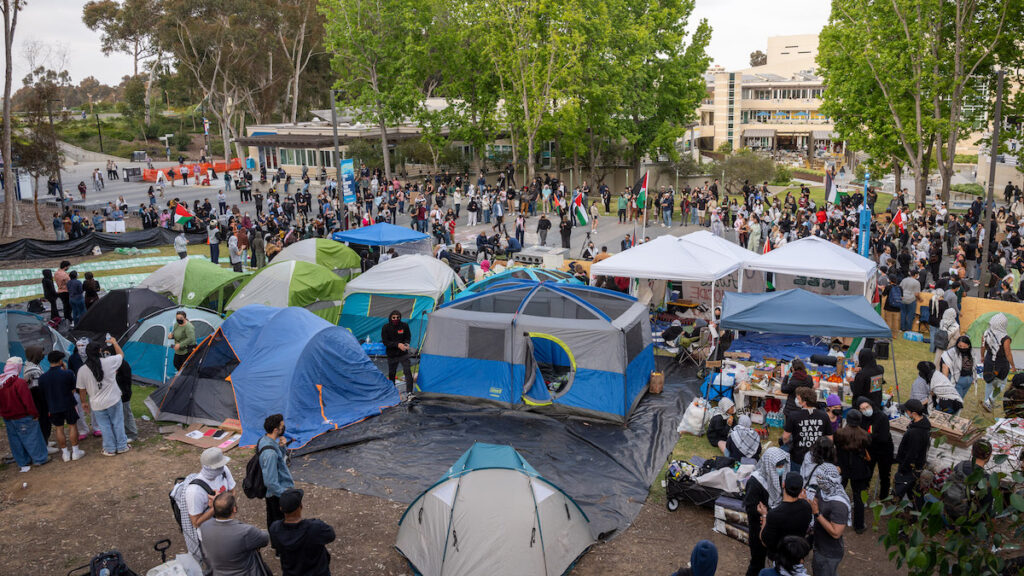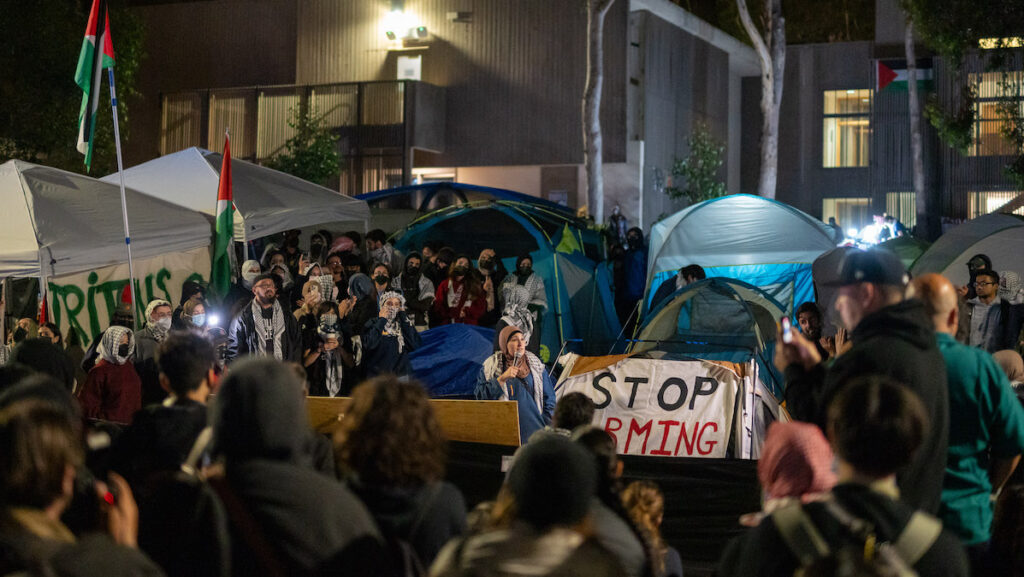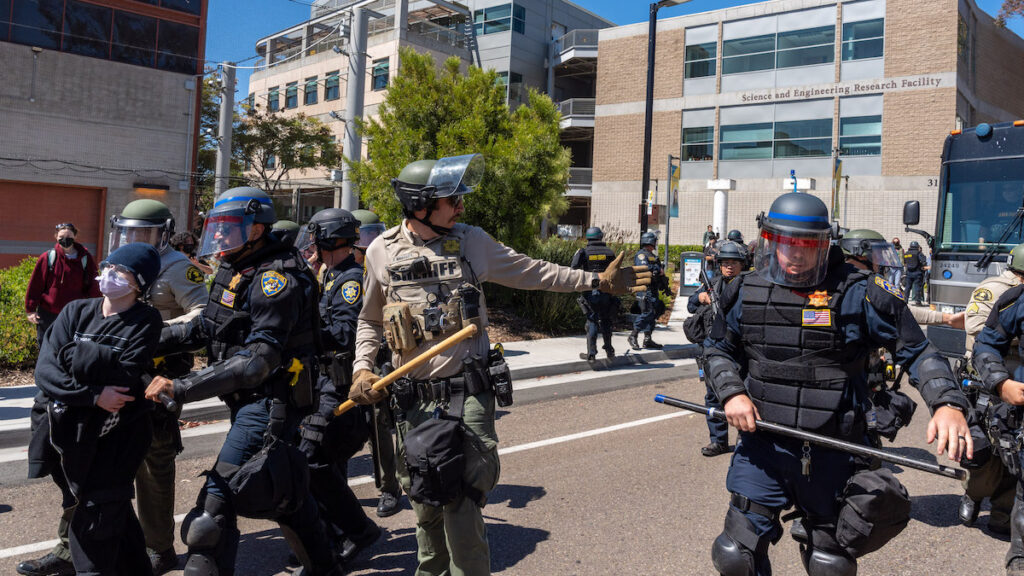It’s a warm spring afternoon, and dozens of students have gathered on the steps of Geisel Library at the University of California, San Diego. Over a hundred students have gathered to protest the Trump administration’s recent revocations of international students’ visas, including six UC San Diego students.
Just a few yards from the gathered crowd is a grassy area. A year ago, the unassuming space became the site of the Liberated Zone, a spontaneous Gaza solidarity encampment organized by a constellation of student organizations, including Palestinian Youth Movement, the UCSDivest Coalition, Jewish Voice for Peace, and Students for Justice in Palestine.
The coalition of student groups and local organizations started the encampment on May 1, 2024, to demand that the university sever its institutional ties to Israel, including research partnerships with the Israeli Defense Ministry, private contractors, and the U.S. Department of Defense. UC San Diego’s Liberated Zone stood for roughly five days, until it was forcibly dismantled by dozens of San Diego law enforcement agencies who descended on the camp in the early morning hours of May 6, 2024, and arrested 64 people.
Now the lawn is quiet, the encampment’s tents, posters, and bustle having subsided long ago. But while pro-Palestine student organizing around the country has largely leveled off since its peak in the spring of last year, the San Diego chapter of the Palestinian Youth Movement has only upped the intensity of its organizing efforts.
With San Diego serving as a major hub for the global arms manufacturing and shipping industry, members say the chapter is in a unique position to directly address militarism and arms manufacturing through their organizing. At the top of its list: Exposing and ending the shipping giant Maersk’s complicity in the Palestinian genocide.

In the belly of the beast
San Diego’s proximity to the U.S. military and auxiliary industries tied to the armed forces make it impossible for many local activists to turn a blind eye to America’s involvement in manufacturing genocide abroad.
“Specifically in San Diego, we have large weapons manufacturing companies,” says Subrein Damanhoury, who has worked as an organizer with the Palestinian Youth Movement’s local chapter since graduating university. “You’ll find people in all different types of jobs that are either contributing or participating in these systems, whether it’s being in the military or it’s working at one of these weapons manufacturers or shipping manufacturers.”
The area is home to a litany of arms manufacturers and defense contractors, including Northrop Grumman and Maersk, which are contracted out by the U.S. military.
According to the San Diego Military Advisory Council, more than 115,000 active duty service personnel are stationed within the city and its surrounding municipalities, making San Diego home to the largest concentration of military personnel in the United States. The organization’s data also shows that more than 230,000 veterans reside in San Diego County. The region boasts 356,000 defense-related jobs locally, with the military having an overall $52.6 billion impact on the local economy.
“We are part of the problem here, and once we start becoming more educated about it, we can come together and collaborate on ways to stop that,” Damanhoury says.

Both of Damanhoury’s parents grew up in refugee camps in Palestine, and she would regularly travel to visit family who still live in the camps.
“It was very weird to me as a child, I didn’t understand much of it because it was kind of normalized,” Damanhoury recalls. “IOF soldiers coming into the camps and tear-gassing people — it wasn’t until I got older, started learning more about Palestine, and going to more of the protests, that I realized this is not normal and this is not what back home is supposed to look like.”
Since graduating from San Diego State University, she has helped coordinate rallies, marches, and the student-led Gaza solidarity encampment at UCSD last spring, as well as the Palestine Youth Movement’s major Mask Off Maersk campaign.
The Palestinian Youth Movement is a transnational grassroots organization whose goal is to unify Palestinians across the diaspora to unite and find solutions to combat Zionism and help Palestinians. Since 2024, the group has led the effort to persuade Maersk, one of the world’s largest shipping and logistics companies, to cease shipping military cargo to Israel.
“In the past couple of months, there has been a lot of evidence shown that they have been shipping military cargo, despite them constantly saying that they have not and do not ship military cargo,” says Damanhoury.
Last fall, the Palestinian Youth Movement released an 11-page report accusing Maersk of shipping “millions of pounds of military goods to the Israeli military from the United States, across more than 2,000 shipments” between September 2023 and September 2024.
In the report, the campaign’s researchers reviewed 2,110 U.S. shipments on Maersk vessels listed as being shipped to or on behalf of Israel’s Ministry of Defense, 827 of which were for armored vehicles, tactical vehicles, weapons systems, or spare parts.
“Labor workers, port workers and union workers are playing a critical role in the movement and actively helping to stop the arming of weapons to Israel.”
The report has sparked real-world action: In April, dockworkers’ unions and pro-Palestine groups staged protests in Tangier, Morocco, where Maersk was to transport cargo they believed included spare parts for American-made, Israeli-bound F-35 warplanes.
“Globally, we have seen an increase in people refusing to participate in arming the state of Israel despite their governments not being willing to take action,” Damanhoury says. “Labor workers, port workers and union workers are playing a critical role in the movement and actively helping to stop the arming of weapons to Israel.”
The campaign is calling upon Maersk to do the following:
- Stop transporting military cargo complicit in the genocide of the Palestinian people.
- Terminate all contracts that support war and genocide, including Maersk’s contract with the U.S. Department of Defense and the Israeli Ministry of Defense.
Since kicking off last year, the campaign has sought to accomplish its goals through a series of actions: block shipments at ports, rallying in front of Maersk offices, sending mass emails to Maersk’s executives and board members, and flooding Maersk executives and board members with comments on LinkedIn and social media platforms.
In March, in spite of rising pressure from human rights groups globally, Maersk’s shareholders struck down resolutions that called for a ban on arms shipments to Israel. The company continues to deny that it ships any arms to Israel, saying in a March 18 statement that “Maersk upholds a strict policy of not shipping weapons or ammunition to active conflict zones.”
Maersk did not respond to questions from Analyst News regarding the Palestinian Youth Movement’s campaign or the company’s decision to strike down the resolution.
When the boomerang comes back
In San Diego, members of the Palestinian Youth Movement have been reaching out to local blue-collar workers — such as dock workers and those in logistics – who are not in regular military service but work in fields that provide support to active duty personnel.
“A lot of the people who are working these kinds of jobs are people of color, and a lot of people are like, ‘Okay, what does Palestine have to do with me? What does this specific cause have to do with me?” Damanhoury says.
She hopes that through education and awareness campaigns, U.S. dock workers will mobilize to follow the actions of their counterparts overseas. “When people start realizing that this is harming other people, they themselves are not going to want to do that. I think it’s just the point of getting people more educated. And that’s really what we are here in San Diego to do.”
If we continue to ignore what is happening in Palestine, it’s going to happen here in the U.S.
Although organizing in a city whose economy is so reliant upon U.S. militarism has been challenging, local activists hope to highlight how U.S. militarism and its arming of Israel also impact Americans through surveillance and overpolicing of marginalized communities.
“I don’t think people realize that a lot of the police who are trained here (in the U.S.) also go to Palestine to be trained by IOF soldiers,” Damanhoury says. As recently as 2019, seven high-ranking law enforcement officials from five San Diego County police agencies reportedly participated in an police training seminar in Israel sponsored by the pro-Israel Anti-Defamation League.

“They learn military tactics from them, and then come back to use all of those war tactics here on the civilian population,” she says. “San Diego actually used to do some exchanges with the Israeli occupation forces, and a lot of those tactics were used here.”
It’s an idea known as the imperial boomerang. The political theory, also known as Foucault’s boomerang, asserts that governments that develop repressive techniques to control colonial territories will eventually deploy those same techniques domestically against their own citizens.
“It affects us all, because they’re all learning from Israel, they’re all learning how to contain communities,” Damanhoury says. “They’re trying to pressure communities and scare them into not fighting back or addressing their concerns. If we continue to ignore what is happening in Palestine, it’s going to happen here in the U.S.”
As investigative journalist Anthony Lowenstein explores in his 2023 book “The Palestine Laboratory,” the very technologies and tactics battle-tested in occupied Palestinian territories are eventually applied to communities elsewhere, including by American police during local protests and riots.
“Those same tactics are carried out time and time again in Black and Brown communities,” Damanhoury says. “That’s why we – as Black, Brown people and people of color — need to realize that all of our struggles are interconnected. And if we don’t realize this sooner, it’s going to be a really bad outcome here.”

